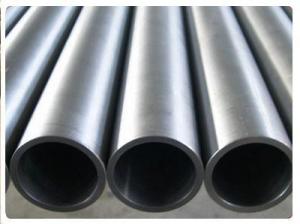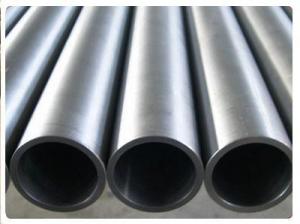Seamless Steel Pipe With Cheap Price From Factory
- Loading Port:
- Tianjin
- Payment Terms:
- TT OR LC
- Min Order Qty:
- 33 m.t.
- Supply Capability:
- 500 m.t./month
OKorder Service Pledge
OKorder Financial Service
You Might Also Like
PRODUCT DETAILS
1.Structure of Seamless Steel Pipe Description:
A large amount of Seamless Steel Pipes is offered to the clients at cost effective rates. These pipes are extremely durable, resistant to corrosion and have high tensile strength. Our pipes are used in nuclear plants, power plants, refineries and construction industry across the country. Furthermore, we are capable of providing these seamless pipes to the clients in bulk quantity.
2.Main Features of the Steel Pipe:
• High manufacturing accuracy
• High strength
• Small inertia resistance
• Strong heat dissipation ability
• Good visual effect
•Reasonable price
3.Packaging & Delivery:
| Packaging Details: | Seaworthy packages, bundles wrapped with strong steel strip |
| Delivery Detail: | 15-30 days after received 30% TT |
4.Seamless Steel Pipe Specification:
| Standard: | GB, DIN, ASTM,ASME, ASTM A106-2006, ASTM A53-2007 |
| Grade: | 10#,20#, 45#, 16Mn |
Thickness: | 8 - 33 mm |
| Section Shape: | Round |
| Outer Diameter: | 133 - 219 mm |
| Place of Origin: | Shandong, China (Mainland) |
| Secondary Or Not: | Non-secondary |
| Application: | Hydraulic Pipe |
| Technique: | Cold Drawn |
| Certification: | API |
| Surface Treatment: | factory state or painted black |
| Special Pipe: | API Pipe |
| Alloy Or Not: | Non-alloy |
| Length: | 5-12M |
| Outer Diameter: | 21.3-610mm |
5.Product pictures
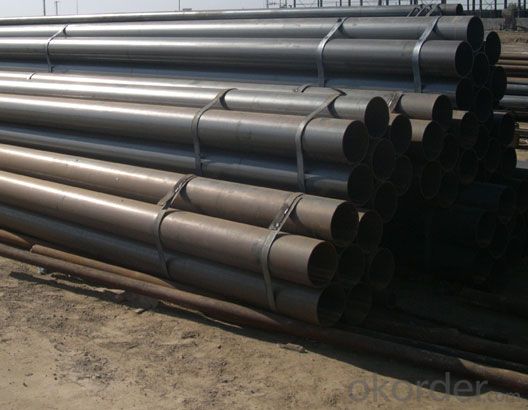
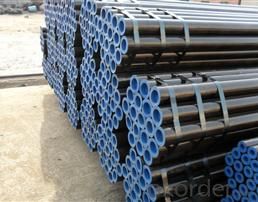
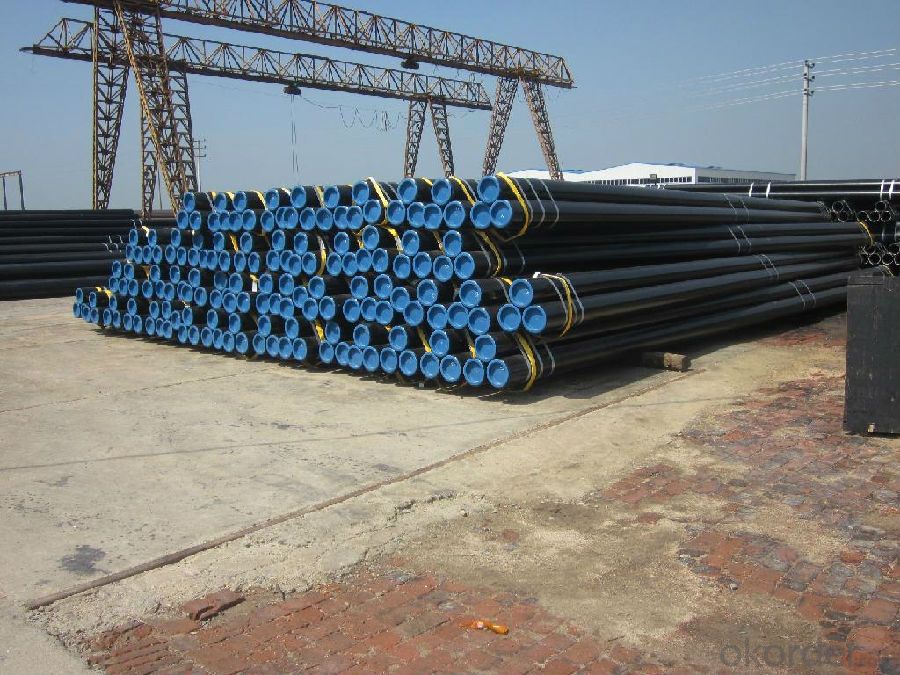
6.FAQ of Seamless steel pipe:
①How is the quality of your products?
Our products are manufactured strictly according to national and internaional standard, and we take a test
on every pipe before delivered out. If you want see our quality certifications and all kinds of testing report, please just ask us for it.
Guaranteed: If products’ quality don’t accord to discription as we give or the promise before you place order, we promise 100% refund.
②How about price?
Yes, we are factory and be able to give you lowest price below market one, and we have a policy that “ for saving time and absolutely honest business attitude, we quote as lowest as possible for any customer, and discount can be given according to quantity”,if you like bargain and factory price is not low enough as you think, just don’t waste your time.Please trust the quotation we would give you, it is professional one.
③Why should you chose us?
Chose happens because of quality, then price, We can give you both.Additionally, we can also offer professional products inquiry, products knowledge train(for agents), smooth goods delivery, exellent customer solution proposals.Our service formula: good quality+good price+good service=customer’s trust.
SGS test is available, customer inspection before shipping is welcome, third party inspection is no problem.
Any question, pls feel free to contact us !
- Q:What is the difference between steel pipes and PPR pipes?
- Steel pipes and PPR (Polypropylene Random Copolymer) pipes are two different types of pipes commonly used in various industries and applications. The main difference lies in their material composition and properties. Steel pipes are made from steel, a strong and durable metal. They are known for their high tensile strength, resistance to extreme temperatures, and ability to withstand high pressure. Steel pipes are commonly used for transporting fluids and gases in industries such as oil and gas, construction, and plumbing. On the other hand, PPR pipes are made from a type of plastic called polypropylene random copolymer. PPR pipes are known for their excellent thermal and chemical resistance, as well as their light weight and easy installation. They are commonly used for hot and cold water supply systems, as well as in heating and cooling applications. In summary, the key difference between steel pipes and PPR pipes lies in their material composition and properties. Steel pipes are stronger and more suitable for high-pressure and extreme temperature applications, while PPR pipes are lighter, easier to install, and ideal for water supply systems.
- Q:Can steel pipes be used for structural supports?
- Yes, steel pipes can be used as structural supports due to their high strength, durability, and ability to withstand heavy loads. They are commonly used in construction for applications such as columns, beams, and braces, providing stability and support to various structures.
- Q:What are the different types of couplings used with steel pipes?
- There are several types of couplings that can be used with steel pipes, including threaded couplings, compression couplings, and flanged couplings. Threaded couplings have threads on the inside and outside that allow pipes to be screwed together. Compression couplings use a compression fitting to connect pipes, providing a tight and secure connection. Flanged couplings have flanges on each end that are bolted together, creating a strong and durable joint.
- Q:How are steel pipes used in the construction of coal-fired power plants?
- Steel pipes are used in the construction of coal-fired power plants for various purposes. They are primarily utilized for the transportation of coal and other materials such as water, steam, and flue gas within the plant. Steel pipes are also used for the construction of high-pressure and high-temperature pipelines, which are essential for the efficient operation of boilers, turbines, and other equipment. Additionally, steel pipes are employed in the construction of structural components, such as support systems, frames, and columns, providing strength and stability to the overall infrastructure of the power plant.
- Q:How are steel pipes insulated?
- Steel pipes can be insulated using various methods such as applying insulation materials like foam or fiberglass wraps, using thermal tapes, or employing pre-insulated pipe systems where insulation is integrated into the pipe during manufacturing.
- Q:How are steel pipes coated for underground applications?
- Steel pipes for underground applications are typically coated using a process called fusion bonded epoxy (FBE) coating. This involves applying a special epoxy powder coating to the surface of the steel pipe and then heating it to fuse the coating into a smooth and durable finish. The FBE coating provides excellent corrosion resistance and protects the steel pipe from the harsh underground environment.
- Q:How to make the steel pipe spray paint is not easy to fall off?
- First you will rust steel, to clean, good quality alkyd rustproof paint, completely dry after brushing paint, color to see his kind of love.
- Q:How are steel pipes used in the construction of dams?
- Steel pipes are used in the construction of dams for various purposes such as water intake/outlet systems, penstocks, and spillway gates. These pipes are essential for transporting water to and from the dam, controlling the flow, and ensuring the dam's stability.
- Q:What is the difference between carbon steel pipes and stainless steel pipes?
- The main difference between carbon steel pipes and stainless steel pipes lies in their composition. Carbon steel pipes are primarily made of iron and carbon, while stainless steel pipes contain iron, carbon, and a minimum of 10.5% chromium. This high chromium content in stainless steel pipes provides excellent corrosion resistance, making them suitable for various applications in industries like food processing, chemical, and oil & gas. On the other hand, carbon steel pipes are more cost-effective and have higher strength than stainless steel pipes, but they are more susceptible to corrosion and thus require regular maintenance and coating for protection.
- Q:How are steel pipes cleaned and maintained?
- Steel pipes are commonly cleaned and maintained through a variety of methods. Firstly, they are often cleaned using chemical solvents or detergents to remove any dirt, debris, or rust. This process is followed by rinsing the pipes thoroughly with water. Additionally, periodic inspections are conducted to identify any signs of corrosion or damage, which are then repaired promptly to prevent further deterioration. Lastly, applying protective coatings or paints on the pipes can help to enhance their longevity and prevent future corrosion.
1. Manufacturer Overview |
|
|---|---|
| Location | |
| Year Established | |
| Annual Output Value | |
| Main Markets | |
| Company Certifications | |
2. Manufacturer Certificates |
|
|---|---|
| a) Certification Name | |
| Range | |
| Reference | |
| Validity Period | |
3. Manufacturer Capability |
|
|---|---|
| a)Trade Capacity | |
| Nearest Port | |
| Export Percentage | |
| No.of Employees in Trade Department | |
| Language Spoken: | |
| b)Factory Information | |
| Factory Size: | |
| No. of Production Lines | |
| Contract Manufacturing | |
| Product Price Range | |
Send your message to us
Seamless Steel Pipe With Cheap Price From Factory
- Loading Port:
- Tianjin
- Payment Terms:
- TT OR LC
- Min Order Qty:
- 33 m.t.
- Supply Capability:
- 500 m.t./month
OKorder Service Pledge
OKorder Financial Service
Similar products
New products
Hot products
Related keywords
